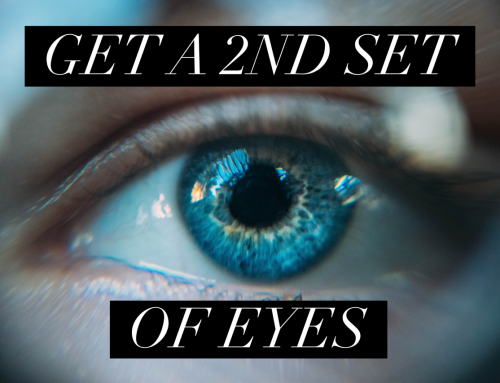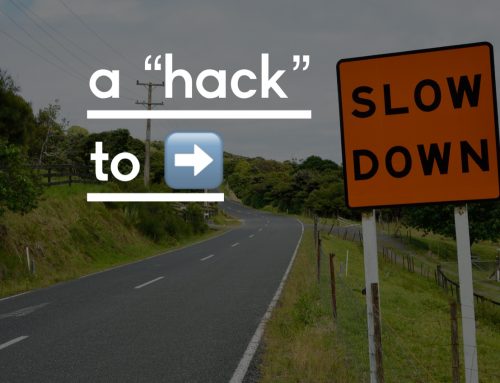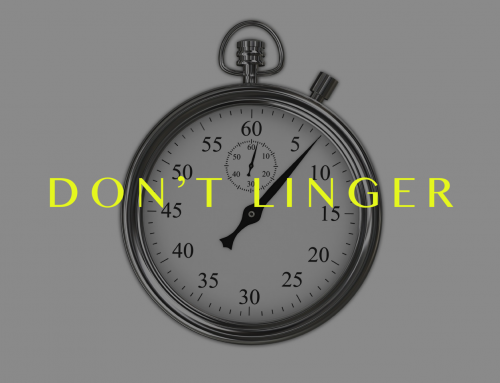If It Can Happen, It Will

It is a near certainty that when you give a speech or appear on camera, something will come up that you didn’t expect. It could be a technical issue, your start time may get pushed back, your segment’s total time may get cut short, somebody’s cell phone may ring, or any of a dozen other situations might occur. If you’re on live TV or in the middle of a keynote address and you’re suddenly distracted, you MUST keep going. The more engaged you are with your storytelling, the easier it will be to do that.
I could give you a ton of examples from my years of TV and public speaking, because there have been a lot of surprises, but I’ll stick to a handful of instances.
I was hosting a live game show on TV when the lights went out in the studio. Literally, all the lights went out and we were in the dark, but still on air. Fortunately, I was able to think on my feet and make a joke about how the darkness was a new obstacle in one of our games. A member of the production crew handed me a flashlight, I turned it on, and we continued the segment for a minute with virtually no light before heading to a commercial.
One year I had the honor of hosting the red-carpet show leading up to Nickelodeon’s Kids’ Choice Awards, live on national television. As the red-carpet broadcast was in its final minute, I walked into the auditorium and all the way to the stage, reading the teleprompter on camera as I did this. The plan was for me to kick off the Kids’ Choice Awards by introducing Rosie O’Donnell, the show’s host. I reached the stage, and reached the end of the teleprompter script, and was about to introduce Rosie when the director yelled in my earpiece, “Fill! Fill!” That meant I needed to stall and fill time because, for whatever reason, they weren’t ready for me to “toss” to Rosie. There I was, on live national television hosting an event that hundreds of thousands of people were watching and I had run out of things to say. Even scarier, I had no idea how much time I needed to fill, but I knew I needed to say something. So, I looked out to the crowd and started asking them if they were excited to see each of the musical guests. Each time I mentioned an artist the audience went nuts and it made for a very exciting start to the Kids’ Choice Awards. When the director told me it was time to throw to Rosie I did so and, as far as the viewers and studio audience could tell, the show went off without a hitch.
You should also expect the unexpected if you’re giving a speech. It’s not unusual for there to be technical problems with your microphone or even your PowerPoint deck. If you’ve built your entire presentation around your PowerPoint and it crashes, you’re on your own. Which is why preparing and rehearsing are imperative. You certainly can’t turn to the crowd and say, “I’ll email you the presentation. Trust me, you’ll really like it,” and then walk off stage. The audience may throw tomatoes at you. You need to stay poised, perhaps even make a joke about the disappearing PowerPoint and act as if you’re in total control, which if you’ve rehearsed properly, you will be.
Here’s a story about one of the most important speeches I ever gave. One year after my stage 3 melanoma diagnosis I decided to speak publicly about what I was dealing with; in the hopes it would educate people about the disease and inspire them to live every day to the fullest. One of my first speeches was at a South Florida American Cancer Society kickoff event for the organization’s upcoming annual gala. Everybody in that room had been touched by cancer in one way or another so certainly they could all relate to my struggle. I figured it would be an easy speech to give, in that there would be plenty of sympathy, if not empathy, from the audience. For the most part, it was. There were approximately 100 people in the room and no chairs, so everybody was standing and gathered. I had a microphone and didn’t need a script, so I was able to walk and talk, and engage the entire room. I would say the speech impacted 95 of those people and I felt a genuine connection with them. But, for whatever reason, five of those people weren’t particularly engaged; in fact, a few of them were texting as I was speaking. Here I am, pouring my heart out about my battle with late stage cancer and, right in front of me, people are on their phones!
This really hurt, and caused me to briefly lose my focus, although I was able to ultimately regain my composure and press on with my story. After the speech all I could think about was those five people. Forget the 95 who gave me a warm ovation and approached me afterwards to wish me well, I couldn’t get past the five people who weren’t moved.
That night, I beat myself up over what I did wrong and why my speech wasn’t better. After a while I settled down and had a change of heart. It occurred to me that I didn’t know why they were on their phones, and I was just assuming the worst. Perhaps they were texting because they were dealing with important situations in their own lives. Maybe they were making notes about melanoma and reminding themselves to schedule dermatologist appointments. Or, maybe they were just jerks and couldn’t be bothered listening to the guy with the microphone. The point is, who knows and, ultimately, who cares. I did my best, I tried my hardest, and that was good enough for me.
You will never win over the entire room; you just won’t. When you see somebody in the audience zone out, you can handle it in a few different ways: you can let it bother you and lose focus, thereby ruining a great speech; you can keep trying to win that person over, although it may very well be a pointless endeavor and a waste of your time; OR you can let that person go and concentrate your energy on all the other people in the room who are listening and who are invested. Feed off their collective energy and give them the great performance they deserve. And when your speech is over, hopefully the few people who weren’t listening will be left wondering what they missed and why everyone else is so inspired.
When it comes to dealing with any distraction or unexpected circumstance, the trick is to be as engrossed in the material as possible. The more present you are, the easier it will be to maintain focus.
If you’d like to learn more about becoming a powerful public speaker, just reach out to me here.
Have a great day!
Dave




